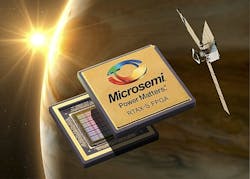Microsemi provides radiation-hardened electronic components for NASA Juno deep-space probe
ALISO VIEJO, Calif., 21 Sept. 2016. Spacecraft designers working for the NASA Jet Propulsion Laboratory in Pasadena, Calif., needed radiation-hardened electronic components for the Juno deep-space probe. They found their solutions from Microsemi Corp. in Aliso Viejo, Calif.
Microsemi officials announced this week that their company contributed rad-hard field-programmable gate arrays (FPGAs), power supply modules, as well as discrete diodes and transistors to the Juno spacecraft, which is in orbit around Jupiter for scientific research and data collection.
The Juno spacecraft, built by a team of Lockheed Martin Corp. and Boeing Co. called United Launch Alliance, launched five years ago from Cape Canaveral, Fla., and arrived in orbit around Jupiter last 4 July. The NASA space probe will collect research data over the next 20 months and then will leave Jupiter orbit.
The Juno spacecraft is in a polar orbit of Jupiter to study the planet's composition, gravity field, magnetic field, amount of water present, and its deep winds, which can reach speeds of 400 miles per hour.
Juno is only the second spacecraft to orbit Jupiter and the first solar powered craft to do so, after the Galileo orbiter mission from 1995 to 2003.
Related: New NASA mission will fly to Jupiter
Juno's power comes only by three solar array wings -- the largest ever deployed on a planetary probe, which help stabilize and generate power.
Engineers from the Boeing-Lockheed Martin United Launch Alliance had to use many electronic components for the Juno spacecraft that can resist the potential effects of radiation in space.
For the Juno spacecraft Microsemi provided the company's RTSX-SU and RTAX-S FPGA families not only for Juno's command and control systems, but also for various deployed instruments that are returning scientific data, company officials say.
Microsemi's high- and low-voltage radiation-hardened power supply modules are supporting Juno's guidance and controls systems, and Microsemi high-reliability discrete diodes and transistors also are part of the spacecraft's mission-critical avionics, officials say.
For more information contact Microsemi online at www.microsemi.com, or NASA at www.nasa.gov.
Learn more: search the Aerospace & Defense Buyer's Guide for companies, new products, press releases, and videos
